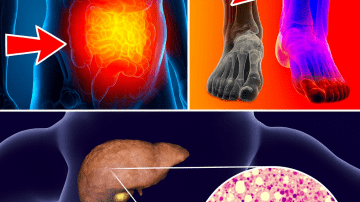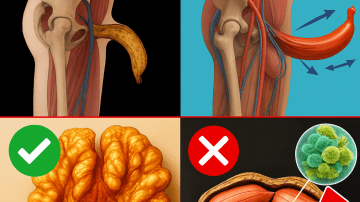Imagine waking up feeling like you’ve run a marathon, your energy drained before the day even begins. Or catching a glimpse of thinning hair in the mirror, wondering why your body feels so off. These subtle shifts might seem like “just aging,” but what if they’re your thyroid sending an urgent SOS? This small, butterfly-shaped gland in your neck controls everything—your metabolism, mood, energy, and even how your body handles daily demands. When it’s out of balance, it can throw your entire life into disarray, especially for women who are uniquely vulnerable during pregnancy, postpartum, or menopause.
🌿 Over 20% of women will face thyroid issues in their lifetime, yet many dismiss the signs, chalking them up to stress or fatigue. Ignoring these symptoms could lead to serious health challenges, from weight struggles to heart issues. But the good news? Recognizing these 14 warning signs can empower you to take control before it’s too late. Ready to uncover what your body’s trying to tell you? Let’s dive into the symptoms that could change how you care for your health forever.

The Hidden Power of Your Thyroid
Tucked just below your Adam’s apple, the thyroid gland is a silent powerhouse, producing hormones that regulate your body’s rhythm—how fast you burn calories, how your heart beats, even how your mind stays sharp. When it’s underactive (hypothyroidism) or overactive (hyperthyroidism), the effects ripple through every system. Women are five to eight times more likely than men to develop thyroid issues, particularly during hormonal shifts like pregnancy or menopause.
Left unchecked, thyroid imbalances can lead to fatigue, weight fluctuations, and even mental fog that steals your clarity. The stakes are high: ignoring these signs could mean years of discomfort or more severe conditions like heart disease or infertility. But by listening to your body, you can act early. Let’s explore the 14 symptoms that every woman should know—and why they’re impossible to ignore.
14 Thyroid Symptoms Women Must Watch For
😴 Unexplained Fatigue That Lingers
Ever feel like no amount of sleep leaves you refreshed? Meet Sarah, a 42-year-old teacher who dragged through her days despite eight hours of rest. Constant tiredness, even after a full night’s sleep, is a hallmark of hypothyroidism. The thyroid regulates energy production, and when it’s sluggish, your body feels like it’s running on empty. Could your fatigue be more than just a busy schedule?
⚖️ Sudden Weight Changes Without Reason
Packing on pounds despite eating the same, or shedding weight without trying? Jane, a 50-year-old nurse, gained 15 pounds in months, baffled by her unchanged diet. Hypothyroidism can slow metabolism, causing weight gain, while hyperthyroidism speeds it up, leading to rapid loss. If the scale’s betraying you, your thyroid might be the culprit.
💇 Hair Loss or Thinning Strands
Noticing more hair in your brush or a thinning ponytail? Thyroid hormones influence hair growth cycles. When they’re out of balance, hair can become brittle, thin, or fall out in clumps. Sarah found clumps on her pillow, a sign her thyroid needed attention. Is your hair sending a warning?
🌵 Dry Skin and Brittle Nails
Rough, flaky skin or nails that crack easily can feel like a cosmetic annoyance, but they’re often tied to hypothyroidism. Low thyroid hormone levels slow skin cell turnover, leaving your skin parched and nails weak. Jane noticed her hands looked aged despite moisturizing. Could your skin be signaling a deeper issue?
🦢 Swelling in the Neck (Goiter)
A visible bulge in your neck could be a goiter, an enlarged thyroid gland. It’s a clear sign of thyroid dysfunction, often linked to iodine deficiency or autoimmune issues. If your neck feels tight or looks swollen, it’s time to take notice.
🗣️ Hoarseness or Voice Changes
Has your voice turned husky or hoarse for no reason? Thyroid imbalances can affect vocal cords, causing subtle changes in tone or clarity. Sarah’s students noticed her voice deepening, a clue her thyroid was struggling. Is your voice trying to tell you something?
🌸 Menstrual Irregularities
Heavy, light, or erratic periods can disrupt your life. Thyroid hormones regulate reproductive cycles, and imbalances can cause unpredictable changes. Jane’s periods became heavier, draining her energy. If your cycle’s off, could your thyroid be the reason?
😔 Mood Swings and Depression
Feeling irritable, anxious, or down without a clear cause? Thyroid dysfunction can wreak havoc on your emotions. Hypothyroidism often brings depression, while hyperthyroidism may spark anxiety. Sarah felt unusually snappy, only to learn her thyroid was off. Are your moods more than just stress?
🧠 Brain Fog and Poor Concentration
Struggling to focus or remember simple things? Thyroid issues can cloud your mind, making work or daily tasks feel overwhelming. Jane forgot appointments, blaming it on age until tests revealed hypothyroidism. Is brain fog stealing your clarity?
👅 Swollen Tongue or Mouth Ulcers
Oral changes, like a swollen tongue or frequent canker sores, may seem random but can point to thyroid trouble. These symptoms often accompany autoimmune thyroid conditions. If your mouth feels off, it might be more than a coincidence.
🌡️ Intolerance to Cold or Heat
Always freezing, even in warm rooms, or sweating excessively? Hypothyroidism can make you sensitive to cold, while hyperthyroidism leaves you overheated. Sarah bundled up in summer, a red flag her thyroid was underactive. Is your body’s thermostat off?
🍽️ Digestive Problems
Constipation slowing you down, or frequent diarrhea disrupting your day? Hypothyroidism often causes sluggish digestion, while hyperthyroidism speeds it up. Jane battled constipation, unaware her thyroid was to blame. Could your gut be signaling a thyroid issue?
💪 Muscle Weakness or Joint Pain
Achy muscles or creaky joints can make movement a chore. Thyroid imbalances disrupt muscle and joint function, causing weakness or pain. Sarah’s morning walks became painful until she addressed her thyroid. Are your aches more than just age?
😴 Sleep Problems
Tossing and turning, or sleeping too much? Thyroid dysfunction can disrupt sleep patterns, leaving you restless or overly drowsy. Jane struggled to fall asleep, feeling wired despite exhaustion. Is your sleep betraying a deeper issue?
Why Women Are at Higher Risk
Women face unique thyroid challenges due to hormonal fluctuations. Pregnancy, postpartum, and menopause are prime times for thyroid issues to surface, as estrogen influences thyroid hormone production. Autoimmune conditions, like Hashimoto’s or Graves’ disease, also disproportionately affect women, making vigilance crucial. Ignoring these symptoms could lead to complications like heart disease, infertility, or chronic fatigue. But catching them early can change everything.
What to Do If You Suspect a Thyroid Issue
If you’re nodding along to several of these symptoms, don’t wait—your thyroid might be crying for help. A simple blood test measuring TSH (thyroid-stimulating hormone), T3, and T4 levels can confirm whether your thyroid is underactive or overactive. Follow these steps to take charge:
🩺 Consult Your Doctor: Share your symptoms and request a thyroid panel. Early detection can prevent long-term damage.
📝 Track Symptoms: Keep a journal of fatigue, weight changes, or mood shifts to help your doctor pinpoint the issue.
🥗 Support Your Thyroid Naturally: While not a cure, foods like seaweed (iodine-rich) or Brazil nuts (selenium) support thyroid function. Avoid excess soy or cruciferous veggies if diagnosed with hypothyroidism.
🧘 Manage Stress: Chronic stress can worsen thyroid issues. Gentle yoga or meditation can help balance hormones.
Sarah and Jane both sought medical advice after noticing multiple symptoms. Simple lifestyle tweaks and medical support helped them regain energy and clarity. Could a doctor’s visit be your next step?
Why Early Action Matters
Ignoring thyroid symptoms can lead to serious consequences. Hypothyroidism, if untreated, may increase cholesterol levels, heart disease risk, or depression. Hyperthyroidism can strain your heart, weaken bones, or cause fertility issues. But with early detection, most thyroid conditions are manageable with lifestyle changes, medication, or natural support. A blood test is a small step that could save years of discomfort.
How to Support Your Thyroid Naturally
While medical care is key, you can complement it with thyroid-friendly habits:
🥬 Eat Nutrient-Dense Foods: Include iodine (fish, dairy), selenium (nuts, eggs), and zinc (seeds, shellfish) to support hormone production.
💧 Stay Hydrated: Proper hydration aids metabolism and energy levels.
🏃 Move Gently: Low-impact exercise like walking boosts circulation without stressing your thyroid.
😴 Prioritize Sleep: Aim for 7-8 hours to help regulate hormones.
These habits amplify your thyroid’s health, enhancing the benefits of any treatment plan.

Why You Can’t Ignore These Signs
Your thyroid is the conductor of your body’s orchestra, and when it’s off-key, every note feels wrong. These 14 symptoms—fatigue, weight changes, hair loss, and more—are your body’s way of waving a red flag. Dismissing them as “just stress” or “getting older” risks missing a chance to reclaim your energy, clarity, and vitality. Women, especially during hormonal shifts, deserve to listen to their bodies and act.
🌟 Imagine waking up with energy to spare, your mind sharp, your body light, and your mood steady. That’s the power of addressing thyroid issues early. Sarah and Jane rediscovered their vibrancy by acting on their symptoms—could you be next?
Take Charge of Your Health Today
Your thyroid might be small, but its impact is massive. Don’t let these 14 warning signs steal your spark. Whether it’s unrelenting fatigue, a swollen neck, or mood swings, your body is speaking—listen to it. A simple blood test could be the first step to a brighter, healthier you.
👉 Grab a notebook, jot down your symptoms, and call your doctor today. Share this guide with a friend who’s been feeling “off”—you might just change their life. Your thyroid is trying to tell you something—don’t ignore its call.
Your Quick Action Plan
🩺 Schedule a thyroid blood test.
📝 Track symptoms for a week.
🥗 Add thyroid-friendly foods like fish or nuts.
🧘 Try a 10-minute daily stress-reliever like deep breathing.
P.S. Did you know thyroid issues were once called “silent diseases” because they’re so easy to miss? Don’t let them stay silent—act now and reclaim your vitality!






